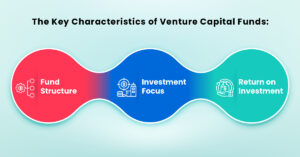
Venture Capital Firms, what are they? What do they do? First thing that comes to mind. Before we answer these questions in detail, let us inform you that these firms are GodFathers to India’s growing StartUps in various sectors. The firms turn your ambitious dreams into reality and a reality beyond your vision.
Read further to not only learn about the top 10 venture capital firms in India but also various aspects related to them.
Table of Contents:
What is a Venture Capital (VC)?
Businesses especially startups or small-scale industries require funds to be exact financial support and expertise to thrive in the market. So, venture capital is a form of investment or private equity given to startups with quick potential growth. It can be a critical source because the financial resources are limited and these funds are given in exchange for minority stakes or ownership in the business instead of traditional loans.
Financial support is necessary for small businesses to carry out their daily operations, build market presence, and refine their products or services. Moreover, industry-specific expertise helps businesses understand market dynamics, emerging trends, and regulatory changes. VCs help startups connect with potential clients, partners, and future investors, helping to build strategic alliances and open new market opportunities.
Also: Understanding what venture capitalists look for in a startup is crucial for aspiring entrepreneurs. If you’re looking to build your financial skills and make informed investment decisions, check out our Financial Modeling course at edZeb to learn how to analyze business models and market trends effectively.
What Is Venture Capital Firm & What Is Venture Capital Fund?
Venture Capital is necessary to fuel the growth of startups in the market. So understanding the mechanism behind VC involves being aware of these two terms: Venture Capital Firm & Venture Capital Fund. These are central to providing the financial backing and strategic support needed by emerging companies to thrive and scale.
What Is Venture Capital Firm
The venture capital firm specializes in investing in startups or businesses at early stages only when there is high growth potential. The VC firms are responsible for managing funds gathered from investors and supplying capital to promising startups in exchange for ownership shares in the company. The key characteristics of venture capital firms include:
Investment Strategy
Venture capital firms strategize their investment in focused sectors, especially technology, healthcare, or fintech to influence growth through their expertise.
Active Involvement
Venture capital firms actively participate in mentoring startups, offering strategic guidance, and using their networks to help the companies succeed.
Team composition
A VC firm comprises partners, associates, and analysts. They source deals, conduct due diligence, and manage investments of the businesses to maximize returns and foster growth.
What Is Venture Capital Fund
The capital raised and managed by the venture capital firms is called the venture capital fund. This capital is sourced from various limited resources such as individual investors, and institutional or corporate investors to invest in early-stage companies. The key characteristics of venture capital funds include:

Fund Structure
Funds are structured on the basis of a limited partnership, which is made of general partners: who are responsible for managing day-to-day funds like filing and signing tax returns, and limited partners: are passive institutional partners or high-net-worth individual partners when dissatisfied with the portfolio manager can hold back additional investment.
Investment Focus
With a focus, funds are invested in areas or stages, such as seed stage, early stage, or growth stage investments in particular industries or geographic regions.
Return on Investment
The primary aim of invested capital is to achieve high returns on investment through initial public offerings IPOs or acquisitions.
Top 10 Venture Capital Firms in India Categorized by Investment Stages
Startups in India are rapidly growing because of the venture capital landscape. From early-stage startups needing seed funding to established companies looking for growth capital, VC firms play a crucial role in financial backing and strategic guidance for success. All venture capital firms are not the same, they specialize in investing in different stages of the startup lifecycle. Read further to learn more about the top 10 venture capital firms in India by various investment stages of venture capital in detail.
Seed Stage Venture Capital Funds
As the name suggests, seed-stage VC Funds help startups at a very early stage. Even before having a proven business model, and significant revenue. These funds help startups with product development, market research, and building a foundational team to grow in the market.
Blume Ventures
One of India’s leading early-stage venture capital funds, located in Delhi and Mumbai. Blume Ventures specializes in helping software, gaming, entertainment, enterprise software, robotics, biotechnology, and healthcare startups with investments at various stages of development. With 75+ active companies, some of the best-performing companies are GreyOrange, Mettl, NowFloats, Unacademy, Dunzo, HealthifyMe, Stellapps, MilkBasket, RailYatri, Servify and Cashify.
Indian Angel Network
Indian Angel Network (IAN) is a group of Indian angel investors funding early-stage startups, with 450 members from 11 countries in 2017. IAN has invested in companies like PregBuddy and SuperProfs. In 2020, IAN announced a joint venture with Bangladesh Angels Network (BAN) to source, cross-refer, and promote linkages in technology-enabled startups in India and Bangladesh, creating an enabling environment for venture investing.
Early Stage Venture Capital Funds
These funds help startups when they have made market-fit products and are ready to scale. The startups then need help in expanding their operations, customer base and refining business models.
Sequoia Capital
Sequoia Capital specializes in seed-stage, early-stage, and growth-stage investments in private companies across technology sectors. With assets under management of approximately US$85 billion. The firm has made investments in India, including Apple, ByteDance, and Cisco. It is structured as a limited liability company, with investors contributing money to a fund that the firm’s general partners then invest in business ventures focusing on young start-ups like Fireworks AI.
Matrix Partners
Matrix Partners is a leading investment management firm. It entered India in 2006, managing investments accounting for a total of $1.5 billion. The firm targets early-stage startups in consumer technology, B2B, and enterprise software sectors, backing over 100 startups including A23, CreditVidya, Captain Fresh, DailyHunt, Foxtale, and Country Delight.
Growth Stage Venture Capital Funds
At the growth stage startups now want to have a strong company presence in the market and want to expand further. So the funds are required to accelerate growth, enhance product offerings, and enter new markets.
Nexus Venture Partners
Nexus Venture Partners has closed its largest-ever fund at $700 million. They focus on growth-stage investments in the technology and consumer sectors having strong market traction. The investments are in AI, SaaS, fintech, and commerce startups in India. The cheque sizes start at $4-5 million and can go up to $10-12 million for scaled companies.
Lightspeed Venture Partners
A global venture capital firm with eleven offices and approximately $25 billion in assets under management. The firm focuses on seed-stage, early-stage, and growth-stage investments in the enterprise, fintech, consumer, and healthcare sectors. Lightspeed has raised $7.1 billion across four flagship funds, including Fund XIV-A/B, Select Fund V, and Opportunity Fund II. The firm also closed a $500M early-stage fund and partnered with blockchain firm Lightspeed Faction. The firm has also supported companies like OYO, Byju’s, and Udaan at various stages of growth.
Late-Stage Venture Capital Funds
They come into action at a later stage, especially when mature startups are preparing for IPOs and other exit strategies. Suh startups need capital for scaling operations, entering new markets, and acquiring competitors.
Tiger Global Management
Known for its aggressive investment strategy, Tiger Global Management is one of the most active late-stage investors in India, founded in 2001 by Chase Coleman III. It invests in startups across sectors such as e-commerce, fintech, and SaaS. Their major investments in Facebook, Alibaba, LinkedIn, and Spotify are among the most noticeable ones apart from others.
Falcon Edge Capital
One of the global investment funds in India focuses on late-stage investments, providing capital for potentially high-growth companies to scale operations, refine product lines, and prepare for public offerings. Falcon Edge Capital has notably invested in best-in-class venture-stage companies like Ola, Meesho, Zeta, Khatabook, and others in India.
Sector-Specific Venture Capital Funds
Some venture capital funds specialize in different sectors like fintech, healthcare, or clean energy so, investing in such startups in various stages depends on their sector expertise.
India Quotient
It is an early-stage venture capital firm that has a reputation for backing unconventional ideas and first-time entrepreneurs, often in sectors that traditional VCs may find too risky or unproven. The notable investments are in Sugar Cosmetics, ShareChat, and LoanTap. India Quotient offers not just capital but also deep operational support, helping startups with product development, market entry, and growth strategies.
Aavishkaar Capital
Aavishkaar Capital is known for its commitment to funding enterprises that generate both financial returns and social impact. Aavishkaar Capital’s investments aim to build scalable businesses that address critical issues like access to clean energy, financial services, and sustainable agriculture. The firm often takes a long-term approach, recognizing that impact investments may require more time to mature like their notable investments are in Nepra Resource Management, Chaitanya India Fin Credit, and Ergos.
How Do You Find Venture Capitalists?
If you are aware of the presence of venture capital firms then in the tech-savvy world it is not a difficult task to find the best venture capitalists on various platforms whether online or offline as well. So let us see how to get venture capital, what you can do, and where you can find them.
Online Search
You can simply google them to find and know more about the venture capital firms or use online platforms like CrunchBase, AngelList, PitchBook, and CB Insights.
Networking Events
There is always an opportunity to attend various startup events where you will be able to pitch your ideas to venture capitalists TechCrunch Disrupt, Web Summit, and Slush are great for meeting VCs and are also valuable for making connections with regional VCs or angel investors.
Social Media Platforms
You can find the presence of venture capitalists on social platforms like LinkedIn, Twitter, and Clubhouse. So you can engage with their content, join relevant groups, and connect with many VCs who share insights and industry trends. It will help you eventually grow if you follow them, and participate in discussions, where many investors host rooms on topics like fundraising, startup strategy, and industry insights.
Join Incubator Programs
Incubators are start-up accelerators. You should join useful programs like Y Combinator, Techstars, and 500 Startups that offer funding, mentorship, and networking opportunities with VCs. Many cities have local incubators that are connected to regional VCs and angel investors.
VC Firm Websites
Many venture capital firms have their respective websites outlining their investment focus, portfolio companies, and the process for submitting a pitch or connecting with partners. So, you can pitch your ideas to them directly. The sites also contain information about the investment criteria and areas of interest, which can help you understand which firms are the best fit.
Apart from these, there are many other sources to find venture capitalists like crowdfunding, VC syndicates, cold outreach, and reading industry publications and reports. Understanding how to obtain venture capital involves using these methods to connect with potential investors. Maintaining your presence in the circle will help to stay updated and help significantly in growing startup businesses.
How To Obtain And Invest In Venture Capital
Obtaining and Investing in venture capital are two distinct processes that are linked to each other.
How To Obtain Venture Capital
Startups need to build a compelling case, connect with the right investors, and present their vision clearly and convincingly. It involves various steps so read ahead to get insights.
Step 1: Develop a Business Plan
First of all, define the mission, vision, and goals for your startup by addressing market needs or unique problems. Moreover, it is better to provide detailed financial projections, including revenue models, cost structures, and expected profits. Highlighting the team’s expertise and experience will help in demonstrating their unique qualifications for the business plan.
Step 2: Strong Pitch
Then, be ready with a pitch. Make a presentation summarizing the business idea, market opportunity, product/service, business model, financials, and funding requirements. Also, consider focusing on the traction metrics and other key performance indicators (KPIs) relevant to your business and practice pitch to ensure it is engaging, concise, and effective.
Step 3: Identify Potential Investors
Find the venture capitalists based on their specializations. This will help you tailor your pitch to their interests. Try to use the existing network to warmly introduce to VCs.
Step 4: Reach Out to Investors
Send personalized emails including the reasons that align with investors thesis. Follow up by providing updates on the progress, traction, or significant milestones achieved by your startup.
Step 5: Conduct Due Diligence and Negotiate Terms
Investors may ask for detailed information about your business, including financial statements, product roadmaps, customer contracts, and legal documents. So, be ready for that and negotiate fair and favorable terms with legal advisors.
Step 6: Build Relationships with Investors
Keeping your investors informed of the progress, challenges, and key developments of the startup helps in maintaining transparency. So, you can take advantage of their experience, network, and guidance to navigate growth challenges, make strategic decisions, and scale your business.
How To Invest in Venture Capital
Aspiring investors need to know how to invest in venture capital so they need to understand the landscape, define their criteria, source deals, and conduct thorough due diligence by following various necessary steps.
Step 1: Understand the Basics
First get to know the different stages of venture capital funding, related risks, and the expected returns. Knowing research market trends through industry reports, following startup news, and joining venture capital communities will help in understanding the basics of investing in venture capital. Only then the investors can initiate the process of how to invest in venture capital.
Step 2: Investment Approach
There are many ways of investing in startups. It can be either done through directly investing in startups, investing in Venture Capital Funds, or joining Angel Networks.
Step 3: Set an Investment Criteria
Decide how much capital you want to venture into investments, in which industry such as fintech, health tech, or consumer goods, and at what stage (e.g., seed, early-stage, growth-stage).
Step 4: Source Deal Flow
In order to source deals, actively network with entrepreneurs, VCs, and industry experts. Use online platforms like AngelList, SeedInvest, and Republic to find startups looking for investment.
Step 5: Conduct Due Diligence
Before investing in any startup evaluate, analyze, and review financials and projections to ensure a strong team capable of adapting to uncertain conditions, while also being critical of overly optimistic assumptions in the startup’s financial health and revenue models.
Step 6: Close the Deal by Negotiating Terms
Work with legal professionals to negotiate a fair deal and sign term sheets, shareholder agreements, and other contracts necessary for startup protection and resources.
Step 7: Monitor and Support Your Investment
Having regular communication with startups in your portfolio is important to stay informed about the progress and challenges. So as an investor, you timely offer mentorship, industry connections, and strategic guidance to help startups grow. Monitor investment performance to make follow-on investments or exit when necessary.
As venture capital trends continue to evolve, it’s important to stay updated on the latest in finance and investment strategies. For more insights, explore our blog on How to Become an Investment Banker and other financial career paths.
Conclusion
Venture capital firms play a critical role in shaping the Indian startup ecosystem, providing the essential funding and strategic guidance needed for growth and innovation. The top 10 investment capital firms are actively investing in the next generation of startups across various stages and sectors. Whether you are an entrepreneur tensed of searching for how to get venture capital funding or an investor seeking opportunities to invest, understanding the landscape of venture capital in India is key to making informed decisions.
FAQ’s
How To Invest In Venture Capital?
Retail investors can access venture capital by investing in publicly traded companies that manage venture capital money like Hercules Capital, Blackstone Group, and TPG Inc, operate in the venture capital space and sell stock directly. So those who wonder how to invest in venture capital, this is the most common way, as individuals are buying shares of stock in a publicly managed firm.
How To Find Venture Capitalists?
It is very easy to find venture capitalists these days through online platforms, social media platforms, networking events, incubator programs, crowdfunding, or reaching out directly via emails or through their websites. Thus, take advantage of these platforms and get your question, about how to find venture capitalists, answered.
What Factors Should Be Considered When Evaluating VC Funds?
There are lots of investment opportunities and start-up pitches, so the VCs look for a management team, business concept and plan, market opportunity, and related risks. However, management is the most important factor in making this decision for a VC. As most of the businesses fail due to a lack of management.
How To Get Venture Capital?
To understand how to obtain venture capital, start by creating a solid business plan that clearly defines your vision, market opportunity, business model, financial projections, and the expertise of your team. Then, pitch your business idea, traction, competitive landscape, and funding needs. After that, you have to find potential investors who align with your sector. Reach out to them with personalized emails, and be prepared to follow up. Once you get their attention, answer questions and provide the rest of the details during the due diligence process.









